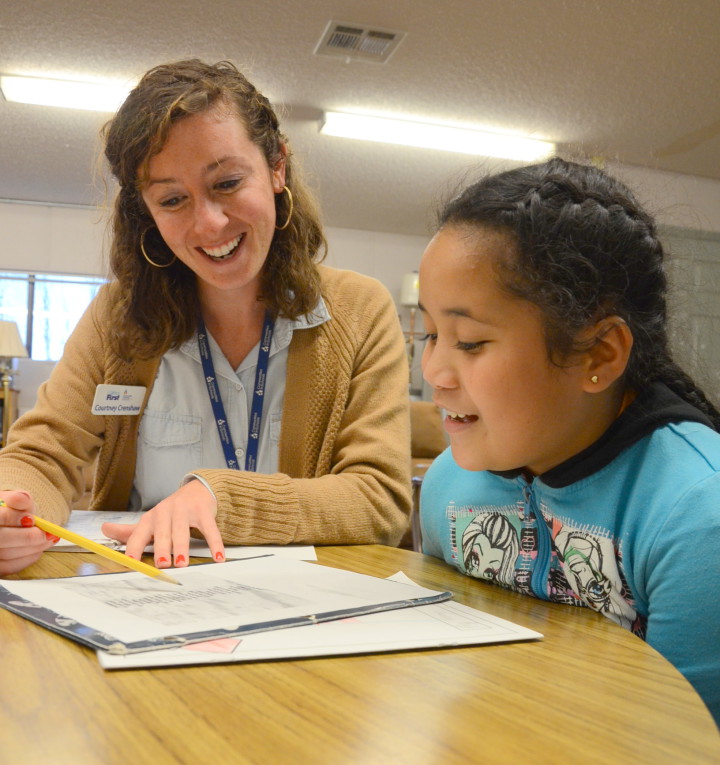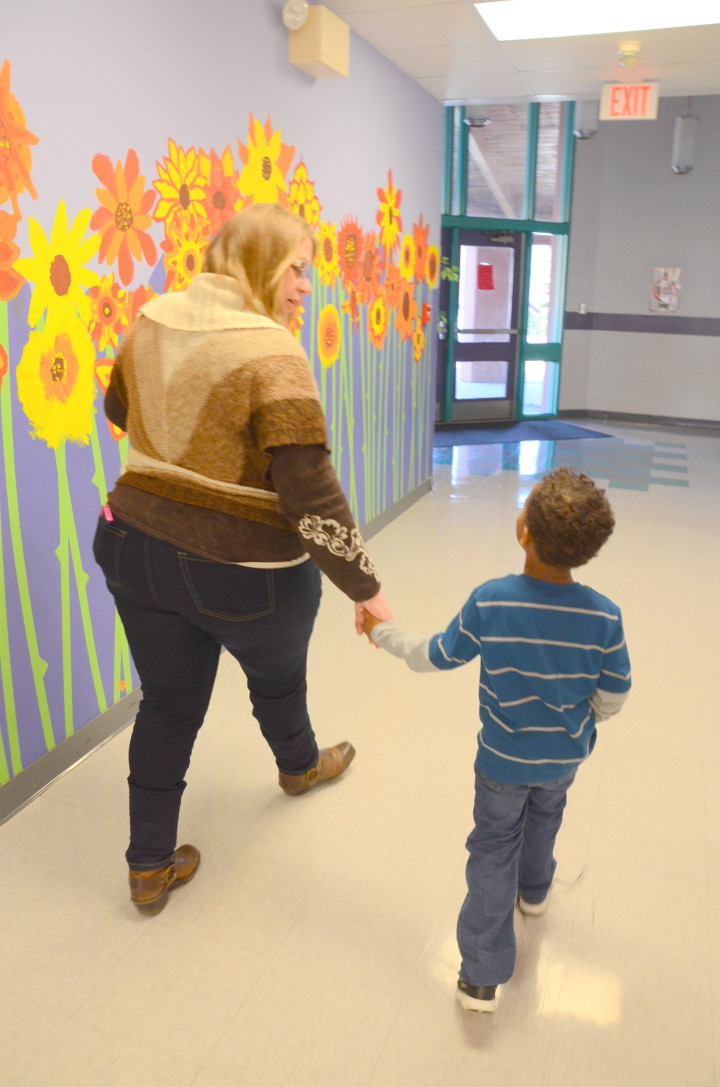Imagine a student arriving to school whose last meal was from a convenience store the night before. He and his family are homeless, so he doesn’t know where he is going to sleep at night. His parents work long hours, so they aren’t there to help with his homework. He arrives to school hungry, tired and unprepared for the day ahead.
As you may have guessed, the chances are much higher that this child is chronically absent, is sent to the principal for behavior problems and is unable to focus in the classroom.
Unfortunately, children in poverty usually experience poorer health, safety and education — as well as greater levels of toxic stress — than children from families with more money. In Buncombe County, right now one in four children are living in poverty.
Children from low-income families are more likely to come to school behind, have undiagnosed learning disabilities, score lower on academic achievement tests and drop out of school. They have less access to adequate health care and are six times as likely to live in homes without enough food and in high-crime neighborhoods.
Children from low-income families are also more likely to experience parental joblessness, substance abuse, homelessness and/or absence of a parent — leading to toxic stress levels that brain research shows hardwires young children’s brains and slows cognitive and emotional development.
The situations seems dire, but local nonprofit Children First/Communities In Schools knows that a proven strategy for alleviating these risk factors is by providing interventions for children and their families at the elementary grade level. That is why they placed Children First/CIS student support specialists in schools with some of the highest populations of students living in poverty — Emma, Estes and Johnston elementary schools and Eblen Intermediate.
“Having our student support specialists placed in high-need schools is providing much-needed support for students, parents, teachers and school administration,” says Allison Jordan, Children First/CIS executive director. “Research has shown that interventions need to start at the elementary grade level to help students develop positive attitudes about school. Our student support specialists give support so teachers can focus on teaching, and students can focus on schoolwork. We need to give our students every opportunity possible to reach their full potential.”

Student support specialists provide integrated student supports, or supports that target academic and nonacademic barriers to achievement. These supports range from making sure students and their families have basic needs met, including food, health care, school supplies and clothing, as well as academic assistance, behavior-monitoring techniques and positive role models. They also track their highest-risk students using the “ABC+P” model — which stands for attendance, behavior, course work and parent involvement. As the Buncombe County affiliate of national dropout prevention program Communities In Schools, Children First/CIS uses evidence-based models to help students succeed in school and life.
“The common denominator with all of the students on my caseload is that they are all living at or below poverty,” says Lisa Barlow, Children First/CIS student support specialist at Emma Elementary and Eblen Intermediate. “They are one meal away from being hungry.”
A = attendance
Chronic absenteeism — or missing 10 percent or more of school days for any reason — is a proven early-warning sign of academic risk and school drop out. The Children First/CIS student support specialists Courtney Crenshaw, Megan Trasport and Barlow not only make a point to track their students’ attendance rates, but they are also able to get to the root causes of why a student is chronically absent.
For example, Barlow noticed one of the students on her caseload, Karen, had missed multiple days of school. She made a visit to Karen’s home to check in, and while there, learned that the hot water heater had died months before. They had been heating hot water on a stove to provide bath water for Karen, but it was an inefficient process, so the first-grader didn’t feel clean and was embarrassed to go to school.
Barlow immediately reached out, and in a matter of days, Children First/CIS and other partner agencies provided the funds for a new water heater, and a local plumber volunteered to install it at no charge. Within weeks, Karen was able to take hot baths and felt more comfortable about attending school.
B = behavior
Research has shown that disruptive behaviors are often indicators of childhood trauma. Students who are angry can be stuck in the “fight” mode of the “fight-or-flight” response. Agitated students unable to keep still can be stuck in the “flight” mode.

In an effort to address the problems that disruptive behaviors can have on the student, teacher and classroom environment, a “social skills” group was formed that is held in the Johnston Resource Center, facilitated by Crenshaw, the school social worker and counselor. Each week, small groups of students who are having difficulty in the classroom participate in practicing grounding exercises, positive imagery, empathy, problem-solving and emotional management. According to a recent study at Duke University, teaching these soft skills is key to preventing criminal and delinquent problems later in life.
“Going down the halls at school, I hear the children talking to each other using the empathy and compassion-based language that we’re teaching, and I see them making the connections,” says Crenshaw. “The Johnston Resource Center is a safe place for them to test boundaries and try out the techniques we’re teaching. We’re giving them a space to learn.”
C = course work
Studies have shown that by third grade, students make the leap from learning to read to reading to learn. Therefore, it is extremely important that students are reading at or above grade level by the third grade.
Because they are placed in schools with high rates of student poverty, Crenshaw, Trasport and Barlow are familiar with this data and the importance of helping students who are struggling academically.
Barlow helped implement the Reading Buddy program, an evidence-based weekly reading program in which volunteers are matched with a struggling third-grade reader.
“Right now we have 14 Reading Buddy volunteers from Congregations for Children who have been coming once a week since January,” says Barlow. “Already we have seen these students become more confident, more fluent in reading and comprehension — plus a bond has been created between tutor and student.”
Trasport created an end-of-grade study group, in which she helped anxious students develop techniques for managing their anxiety and tension. “It was so fulfilling to hear one of the students tell me that she felt much better about taking this test since she started the study group,” says Trasport. “We were able to offer her that space where she could not feel alone in her anxiety — and learn ways of coping with it.”
P = parent involvement
And finally, recognizing that a student’s chances for success are greatly increased when a parent is engaged with their school, Children First/CIS student support specialists are utilized as a bridge between parents and the school. They regularly make home visits and phone call check-ins to make sure supports are in place for the family.
Crenshaw tells of a single mom, Sandra, who is raising six children all under the age of eight. Recently arriving to Asheville from an island country, Sandra was unfamiliar with the school system, language and customs — not to mention overwhelmed with the responsibilities of raising young children with no car, phone or family supports.
During a home visit at Sandra’s apartment, Crenshaw discovered that the oldest children no longer had beds and were sleeping on the floor. She reached out to the Children First/CIS Learning Center coordinator, Barbara Norton, and was told of a supporter interested in donating bedroom furniture. Within a few hours, there were beds and furniture for the children. Their attendance, grades and behavior markedly improved — all because they now had a comfortable place to sleep.
ABC+P = success
The Children First/CIS Student support specialists model has a tremendous impact in helping students succeed in and out of school, and for Barlow, Crenshaw and Trasport, it is all about building relationships.
“When you see a child running and playing, they look like they don’t have a care in the world,” says Barlow. “But what you can’t see is the stress they are dealing with in their young lives. Every parent I work with shares the same goal — they want their children to thrive.”
“We help fill in the gaps,” says Trasport, “so teachers can focus on teaching and the students on learning.”
“This position offers a lot of flexibility because we’re not school personnel, but we do work as a team, so we get a lot of information on which resources a student or their family needs,” says Crenshaw. “I am so inspired by the children I work with. This is challenging work, but I love it.”
Jodi Ford is the outreach and engagement coordinator for Children First/ Communities In Schools of Buncombe County, a local nonprofit that believes all children deserve to reach their full potential. The organization helps achieve this by surrounding children and their families with supports that help them succeed in their schools, communities and homes. Whether that’s providing a food box, tutoring in school and after school, getting school supplies, teaching parenting skills or helping families meet basic needs, the nonprofit is there. Along with direct services, the organization advocates for policies that support families with local and state policymakers. To find out more, go to www.childrenfirstcisbc.org.



P =parental involvement or the lack of is the toughest to overcome.
With the far right, affluenza inflicted gated community families demonize teachers. It is always the teacher’s fault as their precious snowflake raised on Whole Foods sushi for lunch/3 squares a day funded by Dad’s business that exploits the poors for profit and the newest phone in their tiny hands by 2nd grade is so much more important than education. Remember kids, behind every New Age yuppie is a free market capitalist in the financial closet.
With ‘the poors’ schools, the reason the kids aren’t in the right space to learn is for the GOP’s war on the poors- a hungry child is a docile child . Good luck with that all until we NC voters remove the Tea Party from our fair state.
To paint people doing good deeds for poor students is like patching your radiator hose with electrical tape and then singing it’s praises for not fixing the problem properly.